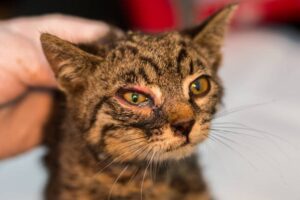-
Adopt
-
Veterinary Care
Services
Client Information
- What to Expect – Angell Boston
- Client Rights and Responsibilities
- Payments / Financial Assistance
- Pharmacy
- Client Policies
- Our Doctors
- Grief Support / Counseling
- Directions and Parking
- Helpful “How-to” Pet Care
Online Payments
Referrals
- Referral Forms/Contact
- Direct Connect
- Referring Veterinarian Portal
- Clinical Articles
- Partners in Care Newsletter
CE, Internships & Alumni Info
CE Seminar Schedule
Emergency: Boston
Emergency: Waltham
Poison Control Hotline
-
Programs & Resources
- Careers
-
Donate Now
 By Angela Mazza, DVM
By Angela Mazza, DVM![]()
angell.org/generalmedicine
generalmedicine@angell.org
617-522-7282
January 2022
What is conjunctivitis?
Conjunctivitis is inflammation of the conjunctiva, which is the membrane that lines the inner surface of the eyelids as well as the third eyelid in dogs and cats. The conjunctiva functions to protect the eye from foreign objects and infection causing micro-organisms as well as to help maintain the tear film. When there is inflammation of the conjunctiva, this often presents with red, itchy, swollen eyes. Discharge may be present or absent. If present it can be white, yellow or greenish and often accumulates in the inside of the corner of the eye. Both eyes are more commonly affected, but they might present unilateral in some cases. There may or may not be other concurrent clinical signs including: blinking or squinting of the eyes, rubbing at the eyes, hair loss around the eyes, and sometimes sneezing, runny nose and cough.
What causes conjunctivitis?
The leading causes of conjunctivitis are infection and allergies. The infection could be bacterial, viral, or possibly both. If your pet has itchy, red eyes, the veterinarian will first want to make sure there is no scratch or corneal ulcer present, which would be more concerning and require specific treatment. If the eye is red, firm, or bulging, glaucoma will also want to be ruled out. From there, it can be hard to know for sure if conjunctivitis is infectious or allergic in origin. Allergic conjunctivitis is more common in dogs. Infectious conjunctivitis is more common in cats.
How do you treat conjunctivitis?
Most often, conjunctivitis is treated topically with either eye drops or ointment. The medications chosen will depend on your pet’s clinical presentation, history, and any testing results if indicated. Medication options include antibiotics, anti-virals, steroids, or combination products. For dogs with allergic conjunctivitis, it may also be recommended to flush the eyes with sterile eyewash to decrease surface irritants by flushing away pollen, dust, or other debris from the eyes. Topical ophthalmic anti-histamines have been utilized with variable success. Elizabethan collars may be recommended during treatment to decrease the risk of self-trauma. Oral medications may be recommended as well, depending on your pet’s history and extent of disease.
 For some dogs and cats, conjunctivitis is an isolated event, and for others, the condition is chronic. If you are worried about the possibility of conjunctivitis in your pet, please make an appointment to have them evaluated by their veterinarian for best long-term success.
For some dogs and cats, conjunctivitis is an isolated event, and for others, the condition is chronic. If you are worried about the possibility of conjunctivitis in your pet, please make an appointment to have them evaluated by their veterinarian for best long-term success.